Pn3 exam 3 questions - Study guides, Class notes & Summaries
Looking for the best study guides, study notes and summaries about Pn3 exam 3 questions? On this page you'll find 222 study documents about Pn3 exam 3 questions.
Page 2 out of 222 results
Sort by
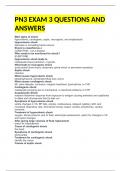
-
PN3 EXAM 3 QUESTIONS AND ANSWERS
- Exam (elaborations) • 5 pages • 2024
-
Available in package deal
-
- $7.99
- + learn more
PN3 EXAM 3 QUESTIONS AND ANSWERS Main types of shock hypovolemic, cardiogenic, septic, neurogenic, and anaphylactic Hypovolemic shock decrease in circulating blood volume Shock is classified as a CONDITION - not a disease Who needs to be monitored for shock? EVERYONE Hypovolemic shock leads to inadequate tissue perfusion - hypoxia What leads to neurogenic shock acute spinal chord injury, temporary spinal shock or permanent paralysis Septic shock infection What causes hypovolemic...
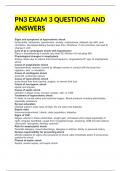
-
PN3 EXAM 3 QUESTIONS AND ANSWERS
- Exam (elaborations) • 5 pages • 2024
-
Available in package deal
-
- $7.99
- + learn more
PN3 EXAM 3 QUESTIONS AND ANSWERS Signs and symptoms of hypovolemic shock tachycardia, tachypnea, hypotension, anxiety, restlessness, delayed cap refill, poor circulation, decreased kidney function less than 10ml/hour. if not corrected, can lead to change in LOC Care of pt in cardiogenic shock with hypotension Place in trendelenburg if systolic less than 80. Monitor VS including I&O Physiological changes in anaphylaxis Airway closes due to edema and bronchospasms. Angioedema #1 sign of ...
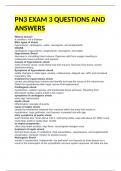
-
PN3 EXAM 3 QUESTIONS AND ANSWERS
- Exam (elaborations) • 5 pages • 2024
-
Available in package deal
-
- $7.99
- + learn more
PN3 EXAM 3 QUESTIONS AND ANSWERS What is shock? a condition, not a disease Main types of shock hypovolemic, cardiogenic, septic, neurogenic, and anaphylactic CHANS cardiogenic, hypovolemic, anaphylactic, neurogenic, and septic Hypovolemic Shock decrease in circulating blood volume. Deprives cells from oxygen resulting in inadequate tissue perfusion and hypoxia Causes of hypovolemic shock most common cause: acute blood loss from trauma, fluid loss from burns, severe diarrhea/vomiting ...
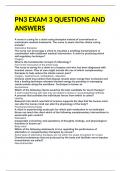
-
PN3 EXAM 3 QUESTIONS AND ANSWERS
- Exam (elaborations) • 4 pages • 2024
-
Available in package deal
-
- $7.99
- + learn more
PN3 EXAM 3 QUESTIONS AND ANSWERS A nurse is caring for a client using therapies instead of conventional or mainstream medical treatments. The nurse is aware that the clients caring include? Alternative therapies The nurse can encourage a client to visualize a soothing mental picture in combination with traditional medical intervention. A client is practicing which self-regulatory technique? Imagery What is the fundamental concept of reflexology? Foot is the microcosm of the entire body...
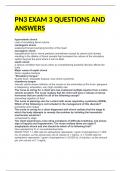
-
PN3 EXAM 3 QUESTIONS AND ANSWERS
- Exam (elaborations) • 3 pages • 2024
-
Available in package deal
-
- $7.99
- + learn more
PN3 EXAM 3 QUESTIONS AND ANSWERS hypovalemic shock Lack of circulating blood volume cardiogenic shock weakened forward pumping function of the heart neurogenic shock hypoperfusion due to nerve paralysis (sometimes caused by spinal cord injuries) resulting in the dilation of blood vessels that increases the volume of the circulatory system beyond the point where it can be filled. septic shock a serious condition that occurs when an overwhelming bacterial infection affects the body Ma...
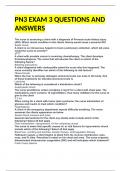
-
PN3 EXAM 3 QUESTIONS AND ANSWERS
- Exam (elaborations) • 2 pages • 2024
-
Available in package deal
-
- $7.99
- + learn more
PN3 EXAM 3 QUESTIONS AND ANSWERS The nurse is assessing a client with a diagnosis of Prerenal acute kidney injury (AKI). Which recent condition in the clients history would cause a prerenal AKI Septic shock A client is on intravenous heparin to treat a pulmonary embolism. which lab value would the nurse to monitor? aPTT A client with prostate cancer is receiving chemotherapy. The client develops thrombocytopenia. The nurse that will educate the client on which of the following topics? ...
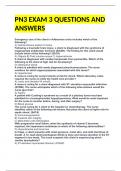
-
PN3 EXAM 3 QUESTIONS AND ANSWERS
- Exam (elaborations) • 2 pages • 2024
-
Available in package deal
-
- $7.99
- + learn more
PN3 EXAM 3 QUESTIONS AND ANSWERS Emergency care of the client in Addisonian crisis includes which of the following? A) Hydrocortisone sodium IV bolus Following a traumatic brain injury, a client is diagnosed with the syndrome of inappropriate antidiuretic hormone (SIADH). The finding for this client would include which of the following? (SATA) A) Oliguria B) Fluid volume excess C) Hypernatremia A client is diagnosed with cardiac tamponade from pericarditis. Which of the following is the...
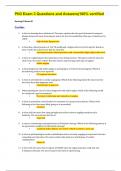
-
PN3 Exam 3 Questions and Answers|100% verrified
- Exam (elaborations) • 10 pages • 2024
-
- $13.49
- + learn more
PN3 Exam 3 Questions and Answers|100% verrified Nursing III Exam III Cardiac 1. A client is learning about cholesterol. The nurse explains that the good cholesterol transports plasma cholesterol away from plaques and to the liver for metabolism. This type of cholesterol is called: • high-density lipoprotein 2. A client has a blood pressure of 124/78 mmHg and a triglyceride level of 160 mg/dL. Based on these results, the nurse knows that the client has: • a prehypertensive blood...
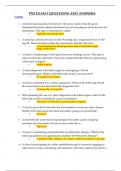
-
PN3 EXAM 3 QUESTIONS AND ANSWERS.
- Exam (elaborations) • 11 pages • 2023
-
Available in package deal
-
- $12.99
- + learn more
PN3 EXAM 3 QUESTIONS AND ANSWERS.1. A client is learning about cholesterol. The nurse explains that the good cholesterol transports plasma cholesterol away from plaques and to the liver for metabolism. This type of cholesterol is called: • high-density lipoprotein 2. A client has a blood pressure of 124/78 mmHg and a triglyceride level of 160 mg/dL. Based on these results, the nurse knows that the client has: • a prehypertensive blood pressure and a borderline high triglyceride level ...
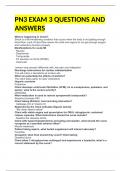
-
PN3 EXAM 3 QUESTIONS AND ANSWERS
- Exam (elaborations) • 9 pages • 2024
-
Available in package deal
-
- $7.29
- + learn more
PN3 EXAM 3 QUESTIONS AND ANSWERS What is happening in shock? Shock is a life-threatening condition that occurs when the body is not getting enough blood flow. Lack of blood flow means the cells and organs do not get enough oxygen and nutrients to function properly Manifestations for acute MI · Nausea · Diaphoresis · Tachycardia . ST elevation on ECG (STEMI) . chest pain -women may present differently with Jaw pain and indigestion Discharge instructions for cardiac catheterizatio...

How much did you already spend on Stuvia? Imagine there are plenty more of you out there paying for study notes, but this time YOU are the seller. Ka-ching! Discover all about earning on Stuvia


